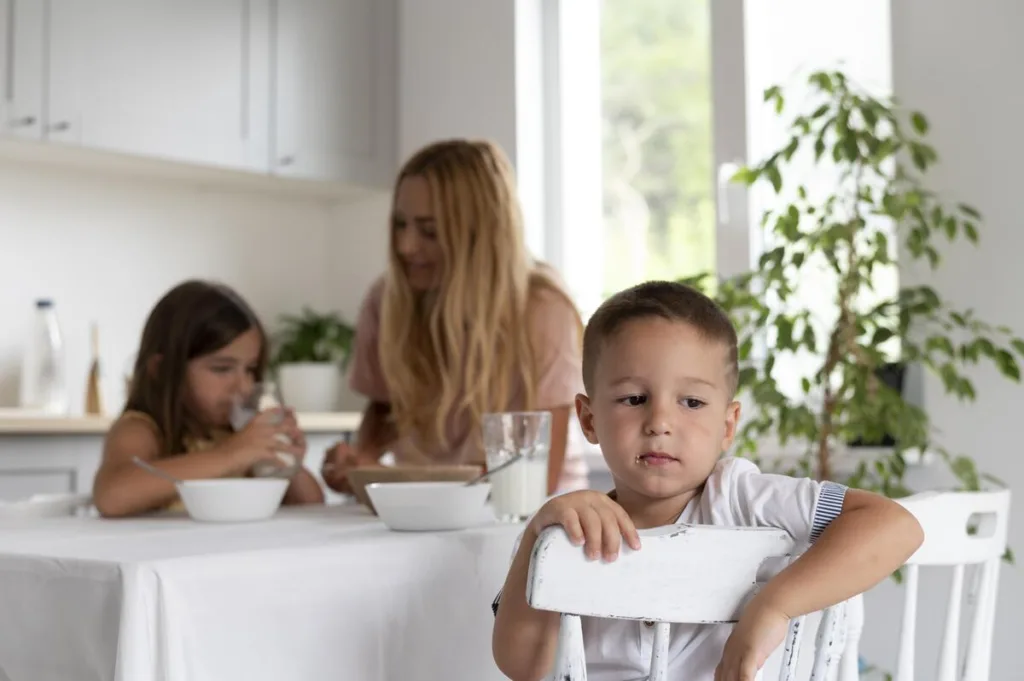Are you wondering what is child rearing? Well, child rearing is at the heart of shaping a child’s future and affects every aspect of their growth and well-being. As parents and caregivers, we all want the best for our young children, and understanding what works and what doesn’t is crucial. It’s not just about following a rule book; it’s about building a loving relationship that encourages positive development. In this article, we’ll share 5 specific practices to avoid in order to create a nurturing environment where your child can truly thrive.
5 Don’ts in Child Rearing
It was love at first sight when they came into this world, and you knew your life would forever change. Some days are easier, while others bring you to the brink of exhaustion. Maybe you get mad when they refuse to clean up their toys or fight with siblings. Sometimes you may let your anger out, and afterward, you are too overwhelmed to apologize. With all this, you are the one that knows your child best, an important figure in their life, even when they’re fully grown.
Child-rearing sums up all the practices we use while raising our kids. The choices we make for healthcare and education, how we enforce good behavior, how we talk to them, and the values we manage to instill. All this while hoping they’ll one day be independent, successful adults. It’s a journey filled with emotion, unique to every family, where understanding what to avoid is as important as knowing what to embrace.
While some parenting practices are obviously detrimental – like harsh physical or verbal punishments, other common mistakes are just as impactful. Here are 5 child-rearing attitudes that ruin your relationship with your child but might slip under your radar.
1. Avoiding Emotional Responsiveness
Statements like “I don’t react to my kid’s misbehavior; I use ignoring to show my disapproval” or “Children will become resilient if we let them cry things out” reflect an approach that can, unfortunately, overlook a child’s emotional needs. If a child feels that their voice is consistently ignored or minimized, they can easily perceive they’re isolated and develop mistrust. When a parent’s reactions are inconsistent – sometimes they are nurturing, and other times they are impatient or dismissive, the child becomes anxious and preoccupied, unsure of the response they will receive or if their needs will be met.
The benefits of being responsive stem from the theory of attachment. This theory says that children need to develop a secure attachment with at least one primary caregiver to create essential emotional self-regulation skills and independence. In short, we all need to know someone is there to catch us when we fall. With children, this is even more important. They need to feel loved and accepted unconditionally, even if they’re A students or struggling with school. They need to know all mistakes are fixable to some extent and that they have someone close to help them.
Children who feel securely attached are more likely to cooperate with their parents. They are also more willing to follow guidance and rules. And this is far better than punishments’ short-term effects; it’s an approach that sets them up for life, creating honest, resilient, and independent adults.
Solution: Emphasizing Emotional Responsiveness and Empathy
Emotional responsiveness in child-rearing is not about indulging every whim or catering to every demand that a child makes. Instead, it’s about recognizing and engaging with children’s feelings as real and important. The bond can be rebuilt at any stage of your child’s life by using a thoughtful approach. Here are some examples:
Have patience if they’re not used to you being responsive: If you’ve never really talked to your child about how they feel, it might be strange for them at first. If you usually tell them that crying or failure is unacceptable, they might be confused or even alarmed by a comforting response. You will have to be patient in these situations, gently showing empathy and understanding. With time, a child will learn that their emotions are valid, and they can express them without fear of reprisal.
Get to know your child: Every child is unique, and understanding their specific needs, interests, and personality traits is vital for parental responsiveness. Spend quality time with your child, engage in their favorite activities, and listen to their thoughts and feelings.
Talk openly about the beliefs that hindered your emotional responsiveness: Sometimes, parents’ own upbringing or personal beliefs may impede their ability to be responsive. Recognizing and openly discussing these factors can help overcome them. Perhaps a parent grew up in a household where emotions were not discussed, leading to a belief that talking openly about feelings is unnecessary or even harmful. Recognizing this belief and working to change it can make a parent more approachable. Therapy or support groups can often help with this process.
👉 Are you a laid-back or strict parent? Learn about different parenting styles in our article and find out which one describes you best. Discover your parenting style now!
2. Relying on Strict Authoritarian Parenting
We all want well-behaved children who are respectful of others, responsible, and serious about school. While some parents may lean towards strictness, inflexible rules, and punishments to achieve this goal, studies and real-life experiences indicate that this approach, known as authoritarian parenting, can negatively affect a child’s autonomy and self-esteem.

Credit: Freepik
For instance, in a household where a child is constantly told what to do, without room for discussion or understanding, they may grow to feel their opinions and feelings don’t matter. A child raised with inflexible rules and a lack of open communication may get used to seeking constant validation from authority figures such as teachers, bosses, or even peers. They may lack the confidence to make choices on their own, always looking to others for guidance and fearing to step out of line. Some children of authoritarian parents develop mental health issues like anxiety and depression or have low self-esteem. The most concerning consequence linked to this parenting style is that children might become hostile, defiant, or turn to substance abuse as a way to assert control in other areas of their life since they feel powerless at home.
Solution: Embracing Authoritative Parenting with Warmth and Support
Conversely, being overly permissive is not the solution either. Authoritative parenting, also known as balanced parenting, is the happy middle. These parents have an approach that combines warmth and empathy with firm boundaries and high expectations. This child-rearing method balances allowing the child some autonomy and adhering to clearly determined standards.
For example, suppose a child throws a tantrum because they want more screen time. In that case, an authoritative parent might acknowledge the child’s disappointment with empathy, explain the rule again, and offer an alternative enjoyable activity. Instead of punishment, authoritative parenting uses guidance and positive reinforcement. A “time out” is not used as a penalty but as a calming period, followed by a conversation about what happened.
When raised by authoritative parents, children are encouraged to think for themselves and become adept at making responsible choices. They grow to become more confident, independent, and empathetic individuals.
3. Practicing Favoritism Among Siblings
As long as they live under the same roof, siblings will have their differences; fighting over little things or struggling with a full-blown rivalry. Blood-relatedness does not guarantee chemistry, and parents are often caught in between. Favoritism doesn’t have to be obvious; it can be in parents’ harmless interventions to keep a peaceful home. When you step in to help them manage their conflicts and give more credit to one or the other, it might be perceived as favoritism. It can have long-lasting effects on family dynamics and create tension and resentment between siblings.

Credit: Freepik
Some parents might jokingly or seriously declare one child as their “favorite.” This is also very damaging, even if meant in jest. Praising one child for an achievement while overlooking a similar success in another can make one child feel favored over the other. The child perceived as the favorite may feel pressure to maintain their status, leading to stress and anxiety. The siblings who feel less favored may harbor resentment towards both the parent and the favored sibling, leading to ongoing conflicts.
Solution: Fostering Equal Treatment and Encouragement Among Siblings
Whether intentional or not, favoritism can add an unnecessary layer of tension and competition. Research shows that siblings tend to have better relationships when they perceive that their parents treat them equitably. Here is how you can increase your children’s perception about being treated fairly:

Credit: Freepik
Same rules and boundaries for similar-age siblings: Applying the same rules and expectations to all siblings ensures that no one feels singled out or unfairly treated. For instance, having the same bedtime or screen time rules for children of similar ages.
Regular family meetings: Holding family meetings where everyone has a chance to speak helps ensure that all voices are heard and any feelings of inequality can be addressed.
Avoiding labels: Labels foster unhealthy competition between siblings as they might feel the need to outdo each other in some aspects. Refraining from labeling one child as the “smart one” or the “athletic one” helps prevent comparisons and encourages each child to appreciate their unique personality.
Model Respect for Uniqueness: Resist the urge to compare siblings with one another. Show through your words and actions that you value each child for who they are, not for a particular talent or trait.
Spend individual time with each child: Make an effort to spend quality time with each child, engaging in activities they enjoy so they all feel valued and special. Even a few dedicated minutes daily can make a difference. Find out what each child likes to do. Maybe one child loves drawing, while another enjoys sports. Engage with them in these specific activities.
4. Using Guilt or Shame as Discipline
Parents usually don’t intend to cause harm in the process of child rearing. It often happens in the heat of the moment when a parent is frustrated or impatient. The goal is usually to get a child to change a behavior. However, the method is misguided. Phrases like “Your friends do better in school,” “You’re so lazy,” or “You never help around the house” might seem like a way to inspire change, but they can be deeply damaging.

Credit: Freepik
The consequences of reacting to your child’s behavior with harsh comments can be lasting and severe. When they hear these negative comments, their stress levels go up, and their confidence goes down. A follow-up study on young adults ages 28-29, who completed a questionnaire about their parents’ child-rearing practices when they were 7 years old, was published recently. It showed that people who were shamed as children might find it hard to go after what they want in life, like a job or a relationship. The voice in their head telling them they’re not good enough can be a barrier to success.
Solution: Using Positive Discipline Techniques

Credit: Freepik
Positive discipline techniques foster a respectful relationship between parents and children. They help build trust, enhance communication, and nurture empathy while guiding children toward responsible behavior. By emphasizing cooperation and understanding rather than punishment, these methods promote a loving and supportive environment where children are encouraged to respect themselves and others.
The power of empathy: When a child is upset or frustrated, instead of dismissing or ignoring the emotions, a parent practicing this approach will recognize the child’s feelings and express understanding. This might include statements like “I can see that you’re really upset” or “I understand why you feel that way.” The key is to avoid placing value judgments on emotions and instead guide the child towards appropriate behavior by explaining the reasons behind specific rules or decisions. The parent can then provide reassurance, teach the child proper ways to express their feelings, and model the behavior they want to see.
Make sure they know what’s expected of them: This approach involves more than just laying down rules; it’s about establishing guidelines that are fair, consistent, and aligned with a child’s age and developmental stage. Rather than focusing on what the child shouldn’t do, positive framing encourages cooperation rather than defiance. Instead of “No bedtime story if the toys aren’t are not in the toy box.” use “If you’re done cleaning up in 20 minutes, we will have time for a bedtime story too.”
Offer choices within limits: By offering options within the bounds of acceptable behavior, parents can empower children to make decisions, building their confidence and problem-solving skills. Suppose it’s time to get dressed for school, and a child is reluctant to get ready. Instead of insisting on a specific outfit, a parent might say, “Would you like to wear the red or blue shirt today? You choose!”.
5. Neglecting Self-Care as a Parent
Child rearing comes first, especially in early childhood. Parents often put their lives on hold to meet their kids’ needs. Fun activities, date nights, or even a relaxing bath can feel nearly impossible to fit into the schedule. But there’s a hidden danger here: parental burnout.
Extensive research indicates that parental burnout isn’t just being tired. It’s a severe problem where parents feel totally worn out. It’s like running a race with no finish line in sight. Burnout can make parents feel depressed and anxious. Another downside is that it often results in irritability, poor self-control and impatience, leading to punitive child-rearing practices like yelling or spanking.
👉 Ever felt like blurting out things during child rearing? There are words you should never say. Explore our article, ‘Things Parents Shouldn’t Say to Their Child,’ and discover the power of positive communication.
Solution: Prioritizing Self-Care to be an Effective Parent
By watching out for burnout signs and taking steps to prevent it, parents can be there for their kids without losing themselves in the process. Regularly setting aside time for hobbies, relaxation, or socializing, is vital for maintaining mental health and emotional balance.
Asking for help doesn’t mean you’re incapable of handling parenting; it means you’re wise enough to recognize that everyone sometimes needs a hand. Whether it’s friends stepping in during a pinch or family offering a much-needed break, accepting help with child rearing can make all the difference.
Conclusion
Raising children is one of the most rewarding jobs in the world, but it’s not without its challenges. Now that you’ve discovered what is child rearing and learned the best practices to raise a balanced kid, you’ll be better equipped to navigate this fulfilling journey. Remember, avoiding harmful practices like not being emotionally responsive, being too strict, favoring one sibling, using guilt and shame, or neglecting self-care as a parent, can promote negative outcomes in a child’s life. By focusing on understanding and empathy, setting fair and consistent rules, and taking care of yourself, you can create a happy and nurturing environment for your kids. It’s never too late to learn new ways of child-rearing that help your children grow into well-rounded and emotionally healthy individuals. Your continuous effort and love will help guide them toward a brighter, more fulfilling future.
Are you a parent seeking to build a loving and harmonious relationship with your child? Join our online event, “5 Steps to Get What You Want from Your Child Without Getting Angry or Giving In.” Our expert speakers will guide you through effective strategies that foster communication, understanding, and mutual respect without resorting to anger or unnecessary concessions. Learn how to set clear boundaries, respond to your child’s needs, and create a positive home environment where everyone feels cared for and protected.
Have a parenting question that requires an immediate answer? Our friendly AI assistant, Sophie, is here to help you ease your mind.
References
Bølstad, E., Havighurst, S. S., Tamnes, C. K., Nygaard, E., Bjørk, R. F., Stavrinou, M., & Espeseth, T. (2021). A Pilot Study of a Parent Emotion Socialization Intervention: Impact on Parent Behavior, Child Self-Regulation, and Adjustment. Frontiers in Psychology, 12, 730278. https://doi.org/10.3389/fpsyg.2021.730278
Chen, Y. (2022). The Psychological Impact of Authoritarian Parenting on Children and the Youth. Proceedings of the 2022 2nd International Conference on Modern Educational Technology and Social Sciences. 888-896, https://doi.org/10.2991/978-2-494069-45-9_107
Gilligan, M., Suitor, J. J., Kim, S., & Pillemer, K. (2013). Differential Effects of Perceptions of Mothers’ and Fathers’ Favoritism on Sibling Tension in Adulthood. The Journals of Gerontology: Series B, 68(4), 593-598. https://doi.org/10.1093/geronb/gbt039
Huffmeijer, R., Bakermans-Kranenburg, M. J., & Alink, L. R. (2014). Love withdrawal predicts electrocortical responses to emotional faces with performance feedback: A follow-up and extension. BMC Neuroscience, 15, 68. https://doi.org/10.1186/1471-2202-15-68
Kiviniemi, A., Koivumaa-Honkanen, H.-T., Heikkinen, H.P., Moilanen, I.K., & Ebeling, H.E. (2022). Is a harsh childhood growth environment reflected in parental images and emotional distress in adulthood? Current Psychology, 41, 2194–2206. https://doi.org/10.1007/s12144-020-00696-2
Kuppens, S., & Ceulemans, E. (2019). Parenting Styles: A Closer Look at a Well-Known Concept. Journal of Child and Family Studies, 28(1), 168-181. https://doi.org/10.1007/s10826-018-1242-x
Mackenbach, J. D., Ringoot, A. P., Verhulst, F. C., V. Jaddoe, V. W., Hofman, A., Jansen, P. W., & Tiemeier, H. W. (2014). Exploring the Relation of Harsh Parental Discipline with Child Emotional and Behavioral Problems by Using Multiple Informants. The Generation R Study. PLoS ONE, 9(8). https://doi.org/10.1371/journal.pone.0104793
Piotrowski, K., Bojanowska, A., Szczygieł, D., Mikolajczak, M., & Roskam, I. (2023). Parental burnout at different stages of parenthood: Links with temperament, Big Five traits, and parental identity. Frontiers in Psychology, 14, 1087977. https://doi.org/10.3389/fpsyg.2023.1087977
Roskam, I., Aguiar, J., Akgun, E., Arikan, G., Artavia, M., Avalosse, H., Aunola, K., Bader, M., Bahati, C., Barham, E. J., Besson, E., Beyers, W., Boujut, E., Brianda, M. E., Brytek-Matera, A., Carbonneau, N., César, F., Chen, B., Dorard, G., . . . Mikolajczak, M. (2021). Parental Burnout Around the Globe: A 42-Country Study. Affective Science, 2(1), 58-79. https://doi.org/10.1007/s42761-020-00028-4
Suitor, J. J., Sechrist, J., Plikuhn, M., Pardo, S. T., Gilligan, M., & Pillemer, K. (2009). The Role of Perceived Maternal Favoritism in Sibling Relations in Midlife. Journal of marriage and the family, 71(4), 1026. https://doi.org/10.1111/j.1741-3737.2009.00650.x
Wang, T., & Kenny, S. (2014). Longitudinal Links between Fathers’ and Mothers’ Harsh Verbal Discipline and Adolescents’ Conduct Problems and Depressive Symptoms. Child development, 85(3), 908. https://doi.org/10.1111/cdev.12143










